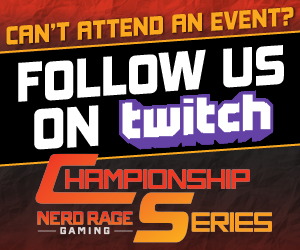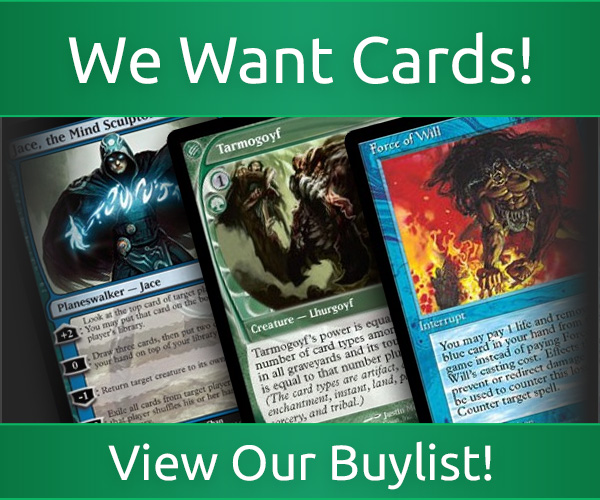Max Kahn: Four Misconceptions About Judging
While many players may have had a friendly interaction with a judge at an event or are close friends with the judge that runs their store’s weekly FNMs, players still tend to be unaware of what judges do and what judges know.
To help create a better understanding of what being a judge is all about, I’m going to tackle four  common misconceptions that players often have about judges and try to address why people think they are true. While there are exceptions to every rule, I am confident in saying that these misconceptions don’t apply to at least 95 percent of the Magic Judge community.
common misconceptions that players often have about judges and try to address why people think they are true. While there are exceptions to every rule, I am confident in saying that these misconceptions don’t apply to at least 95 percent of the Magic Judge community.
Misconception No. 1: Judges get information before players
While we all try to forget the Kozilek/Wastes incident, judges do not receive information before players do. In the weeks leading up to a set’s release, players often ask me what the returning mechanics are, if there are any sweet reprints, or about cool new cards. I assume that they think that judges receive a “Godbook” of the upcoming set so we can familiarize ourselves with the new cards and abilities in a set. Unfortunately, we don’t.
When Spoiler Season for a new set begins, judges are just as excited as players are to see the new cards and mechanics. However, there is additional discussion going on between judges behind the scenes. When mechanics are announced, Matt Tabak, the Magic Rules Guru, writes an article briefly describing how the ability works, but the wording of the Comprehensive Rules entry for the ability is not released. Most of the time, the mechanic is straightforward enough to properly give judge rulings based on Tabak’s description. But some mechanics, such as Exploit and the Processor ability, still have many in the Judge Forums asking questions about interactions. If you’ve ever heard a judge tell you that they can’t give rulings based on unreleased cards, this is why. Sometimes, the Comprehensive Rules entry will clarify a part of the mechanic that is key for understanding how or why it works. For Processors, for example, it clarified how Processing worked with face-down cards in exile.
So, during Eldritch Moon spoiler season, I’ll be refreshing the Mothership everyday at 10 a.m. Central because I don’t know what will be in the set, and I assure you that I’m just as excited as you to find out.
Exception: Some judges, such as Aaron Lacluyze and Toby Elliott, work with the Magic Rules team to write the Release Notes and Policy Updates for upcoming sets, so they do have prior information about Magic releases. However, there are restrictions on what they can and can’t share.
Misconception No. 2: Answering a judge call is easy
Let’s walk through a typical judge call:
1. “JUDGE!!!!”: First, we get the call, and you can typically get an idea of what the ruling will be about based on how the judge call is made. If there’s one player sheepishly saying it, it’s likely a rules question that they need help answering. However, when both players loudly call for a judge simultaneously, you may need to bring backup.
1.5. As I walk to the table, I always take a look at the round timer and mentally note the time in my head. We don’t know if the ruling will take one minute or 10 minutes, and we want to make sure to give the proper time extension when the ruling is over.
2. Approaching the table: If only one of the two players called for a judge, I’ll always walk up to the table on that players’ side. If they have a question about a card in their hand or need Oracle text, it’s just more efficient to go directly to that player. If both players called for a judge, I’ll just walk to the side of the table that’s more convenient for me.
3. Figuring out the problem: If only one of the players called for a judge, this is typically very easy. It’s likely that I’ll need to give Oracle text or explain how a card in the player’s hand works with a permanent on the board (this typically involves a lot of pointing). Most of the time, I’ll pull the player away from the table so that they can ask me their question without giving information to their opponent. When it’s two players that call for a judge, things are a lot harder, and we’ll do something called an Investigation. I’ll typically give the player that looks the most distressed the opportunity to talk first, and have the opponent add any information they would like to the story after the first player finishes. However, sometimes it isn’t that easy. Occasionally, I’ll have to do the “talking sticks” method where you pass something back and forth so that players don’t interrupt each other while talking. Hearing the correct story of what happened is critical for determining how the ruling will play out.
4. Assessing the situation/giving a ruling: Now that I’ve figured out what happened, I have to figure out what to do about it. Luckily, the Infraction Procedure Guide (IPG) gives clear definitions of the different types of penalties players can acquire during gameplay and instructions on how to fix these problem. It’s important to walk the players through how you’ll fix the boardstate before you go through the steps of fixing the game in case you misunderstood the initial problem.
4a. (Ruling is appealed) There’s a lot that goes through a judge’s mind while answering a judge call, and occasionally they miss things. Luckily, the appeals process is available as a safeguard against a bad ruling, and more likely than not, the Head Judge will give the correct ruling.
4b. (Regardless of appeal or not) Give the proper time extension: While we don’t want the event to drag on (I’ve seen time extensions for up to 25 minutes for some investigations), we need to make sure that the judge call didn’t affect the players’ time to finish their match. This is key, since we don’t want players feeling disincentivized to call a judge because they feel it will waste their time to win the game.
That’s a lot of work to answer a judge call, and I didn’t even touch on reading body language, determining if a player may be lying, the types of penalties players receive, a possible downgrade or upgrade of the penalty, or what happens during an appeal. This seems like another whole article by itself. And by now, hopefully you’ll see that answering a judge call isn’t all that easy.
Misconception No. 3: Judging isn’t hard work
We aren’t working 40 hours a week on an assembly line, but judging is certainly hard work, and the amount of work grows exponentially with the amount of players at an event. Let’s take a little trip through a typical Round One of work for an L2: head judging a PPTQ.
10 a.m.: Player Meeting and collection of decklists
10:05 a.m.: Post pairings, print out and cut match slips, distribute to players
10:10 a.m.: Print full players list, alphabetize decklists/verify that each decklist is accounted for, begin to check each decklist for Standard legality, 60/15 cards, and no more than 4 rule (this takes approximately 30 seconds per deck once you get good).
10:30-10:40 a.m.: Mid-round Deck Check if you’re feeling ambitious.
10:40 a.m.: Begin End of Round Procedures: Figure out which tables have time extensions, put in last entry slips, have judges (if available) sit on the final tables and watch for Slow Play.
11 a.m.: Hopefully, the round is over by this point. Now repeat four or five more times. Oh yeah, and you’ve had to answer judge calls and give rulings the whole time.
So when you’ve decided to drop from the event and head home, please think of the judges that have made your experience possible. They likely showed up before you in the morning and will certainly stay after the last match has finished. They’ve helped you with your rulings and penalties, thrown away your empty water bottles and crumpled-up life pads, returned your lost dice bag and car keys, cleaned up the soda that spilled on someone’s playmat, and pushed in your chair, all while being friendly and trying to create a good customer service experience. Before you leave, thank the judges: they do a lot of work.
Misconception No. 4: Judges don’t play Magic
If you’ve ever been to a large event, you’ve likely heard the phrase, “Those that can’t play judge”. And this is somewhat true. While the Judge community certainly has some good players, such as Pro Tour Top 8ers Rob Castellon (L3) and Melissa DeTora (former L2), judges volunteer their free time at Magic events specifically to not play Magic. Whether or not judging makes you actively bad at Magic is another debate I love talking with players about, but being bad at something certainly doesn’t mean they don’t play.
Time to break the misconception: Judges are typically the most active fans of Magic and likely play regularly, but it’s unlikely to be Tier 1 Standard, especially as you look at higher levels of judge. Typical floor judge compensation, at least in the Midwest region, is either $100 store credit or a booster box of a standard-legal set for a day of working an event. It’s certainly not enough credit to build up a collection to play Tier 1 Standard decks. Besides, if the judge continues to work events instead of playing, they won’t even get the opportunity to use their Standard decks outside of the occasional FNM.
That’s why you’ll see many judges play EDH. In fact, the beginnings of the EDH format came out of something that early Pro Tour judges used to socialize after a day of judging Magic. Each time judges work an event, they can use their credit or product to slowly upgrade both the quality and the quantity of their Commander decks, and their decks never “rotate” like they do in Standard. Some judges that strongly dislike EDH (like me) tend to use their credit towards other Magic products that aren’t time-sensitive. Many long-time judges have reserves of fetches and dual lands, pimped-out cubes, and collections of expensive cards for this reason (Editor’s Note: Such as Max’s newly acquired foil Worldgorger Dragon, which is clearly the best card in his mythic rare cube.)
So, in short, judges pretty much have to play Magic in order for their booster boxes and credit to mean anything. While some former L4s and L5s certainly didn’t play as much Magic as a fairly inactive Level 1 might have, after a long day of judging Magic, we still get that itch to play and we’ll bust out Commander decks or Judge’s Tower to satisfy that craving.
Hopefully I’ve given you insight into the life of a Magic Judge and how we operate at tournaments. While all of these misconceptions could be addressed in individual articles, I hoped that this mixed bag has given you more appreciation for the amount of work and dedication that your local judges put into this game so that you have a great experience playing it. As always, if you have any further questions, feel free to tweet me @MaxPlaysMTG or post in the comments section below and I’ll see what I can do. Until next time!
Max Kahn is a Level 2 judge from Buffalo Grove who serves as the head judge for the Nerd Rage Gaming Championship series. He was recently nominated for the latest wave of the Judge Exemplar program.



